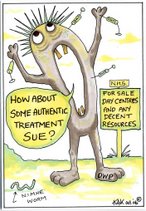.

Failure To Monitor and Failures Of Openness
Its amazing that even when 400 (and its likely to be far more) people die earlier than they should have, the Staffordshire Foundation Trust Enquiry was politically steered away from total openess as "Cure The NHS" an active group of patients and carers who lost people wanted .
Ahh but the UK being what it is will weave a subtle gag here and there and no-one will be charged with corporate manslaughter or got rid of in a way that sends a clear signal across the UK that its public owns the services and not the politicians , who are dishonest enough to want to hide their own shortcomings with more recent attempts to frustrate the operation of the Freedom of Information Act over their unfairly claimed expenses .
Read on and then ask yourself a question about staff - and the fear-context they live in but are only just hinting at . The NHS via well rewarded top executives, bullies its way by driving its policies across the public's lives .. Its like a motorway mentality rolling across beds of people .. Its not isolated to Stafford at all . Health Service Journal has carried stories about this culture of bullying through 2008 and 2009 .
Cure the NHS made forceful representations to me that I should hold the Inquiry in public, even though it was not a ‘public’ inquiry in the sense of being an inquiry under the Inquiries Act 2005. I received written representations from some members of the public to the same effect. The principal reasons given were that those most affected by what had happened at Stafford Hospital were entitled to be able to see and hear Trust management account for what had happened; they could not be satisfied that there had been a proper and rigorous inquiry unless it was in public; and the public had a right to know what had happened and why. It was also argued that the Inquiry would be better informed if its process was in public, because the publication of evidence as it was given would allow others to comment on it more freely. On the other hand, the Health Select Committee, chaired by the Rt Hon Kevin Barron MP, endorsed the view of the Royal College of Nurses that an inquiry hearing evidence in private would encourage members of staff to give evidence in confidence in order to find out why what happened was not detected by the Trust Board.
17.
In the course of my preliminary consideration of the material available to me, it became clear that there were likely to be many members of hospital staff, both past and present, who would be very reluctant to give evidence to me at a public oral hearing. Some were likely to be afraid of the reaction of colleagues, and others of the reaction of the Trust and its management. While some no doubt wished to avoid the stress of an appearance in the glare of publicity.
18.
That such fears existed was confirmed by various encounters I had with staff. For example there were some clinical and nursing staff who made themselves known to the Inquiry who made it clear that they were prepared to provide information but not at an oral hearing held in public. Indeed, some were only prepared to be interviewed somewhere other than at the Inquiry’s premises. As a result, I and members of my team had to see some witnesses in premises elsewhere, or even in their homes. Whether such fears or reluctance were justified, I am confident that many of the witnesses who have assisted the Inquiry by written or oral evidence would not have done so had the Inquiry been conducted in public.
19.
I also held a series of meetings for staff at the hospital, further described below. Some of these were attended by a very small number. It was clear to me that some of those, in particular nursing staff, were very hesitant to express views which they feared might be considered disloyal to their employer, if those views came to the Trust’s attention. A phrase commonly used was “I cannot believe I am saying this”. Again, such individuals would have been most unlikely to attend a public hearing.
37. I heard much evidence suggesting that members of staff lived in an atmosphere of fear of adverse repercussions in relation to a variety of events. Part of this fear was promoted by the managerial styles of some senior managers. Former Director of Human Resources, Norma Sadler agreed that an explanation for staff’s reluctance to come forward with concerns was that they were scared."
Ahh but the UK being what it is will weave a subtle gag here and there and no-one will be charged with corporate manslaughter or got rid of in a way that sends a clear signal across the UK that its public owns the services and not the politicians , who are dishonest enough to want to hide their own shortcomings with more recent attempts to frustrate the operation of the Freedom of Information Act over their unfairly claimed expenses .
Read on and then ask yourself a question about staff - and the fear-context they live in but are only just hinting at . The NHS via well rewarded top executives, bullies its way by driving its policies across the public's lives .. Its like a motorway mentality rolling across beds of people .. Its not isolated to Stafford at all . Health Service Journal has carried stories about this culture of bullying through 2008 and 2009 .
Private nature of the Inquiry Page 33
16.Cure the NHS made forceful representations to me that I should hold the Inquiry in public, even though it was not a ‘public’ inquiry in the sense of being an inquiry under the Inquiries Act 2005. I received written representations from some members of the public to the same effect. The principal reasons given were that those most affected by what had happened at Stafford Hospital were entitled to be able to see and hear Trust management account for what had happened; they could not be satisfied that there had been a proper and rigorous inquiry unless it was in public; and the public had a right to know what had happened and why. It was also argued that the Inquiry would be better informed if its process was in public, because the publication of evidence as it was given would allow others to comment on it more freely. On the other hand, the Health Select Committee, chaired by the Rt Hon Kevin Barron MP, endorsed the view of the Royal College of Nurses that an inquiry hearing evidence in private would encourage members of staff to give evidence in confidence in order to find out why what happened was not detected by the Trust Board.
17.
In the course of my preliminary consideration of the material available to me, it became clear that there were likely to be many members of hospital staff, both past and present, who would be very reluctant to give evidence to me at a public oral hearing. Some were likely to be afraid of the reaction of colleagues, and others of the reaction of the Trust and its management. While some no doubt wished to avoid the stress of an appearance in the glare of publicity.
18.
That such fears existed was confirmed by various encounters I had with staff. For example there were some clinical and nursing staff who made themselves known to the Inquiry who made it clear that they were prepared to provide information but not at an oral hearing held in public. Indeed, some were only prepared to be interviewed somewhere other than at the Inquiry’s premises. As a result, I and members of my team had to see some witnesses in premises elsewhere, or even in their homes. Whether such fears or reluctance were justified, I am confident that many of the witnesses who have assisted the Inquiry by written or oral evidence would not have done so had the Inquiry been conducted in public.
19.
I also held a series of meetings for staff at the hospital, further described below. Some of these were attended by a very small number. It was clear to me that some of those, in particular nursing staff, were very hesitant to express views which they feared might be considered disloyal to their employer, if those views came to the Trust’s attention. A phrase commonly used was “I cannot believe I am saying this”. Again, such individuals would have been most unlikely to attend a public hearing.
See also this Page 159
"Concerns raised by staff
Bullying
"Concerns raised by staff
Bullying
37. I heard much evidence suggesting that members of staff lived in an atmosphere of fear of adverse repercussions in relation to a variety of events. Part of this fear was promoted by the managerial styles of some senior managers. Former Director of Human Resources, Norma Sadler agreed that an explanation for staff’s reluctance to come forward with concerns was that they were scared."
And the Government do not wish more openness ?
Goodbye Labour ...
Goodbye Labour ...

.jpg)







No comments:
Post a Comment